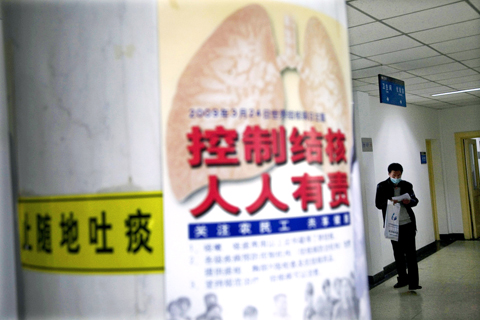The Beijing Chest Hospital was packed with people on a recent weekday morning. In the waiting area, Wang Chong, a migrant worker who has been fighting tuberculosis for several months, was facing a dilemma: Does he continue treatment that has already cost him more than US$5,000 or stop before his savings are wiped out?
It’s not only his health at stake. If Wang stops treatment prematurely, his tuberculosis is likely to morph into one of the new, hardier strains that resist the drugs he has been using and that pose a growing threat to global public health. Countries as diverse as China, Russia and South Africa are vulnerable, and the new strains have also appeared in the US.
“TB is now taking on a deadly new form — one that will spread further,” said Cornelia Hennig, the WHO’s TB program coordinator for China. “We can choose: Either we act now with rational and proven approaches, or we pay later with a worsening epidemic.”

PHOTO: AP
The WHO is trying to bring renewed vigor to the fight with a three-day meeting of health ministers from the worst-affected countries in Beijing starting tomorrow. Also attending are WHO Director-General Margaret Chan (陳馮富珍) and Bill Gates, co-chair of the Bill & Melinda Gates Foundation, a major contributor to research on global health problems. Countries are expected to draw up five-year plans to prevent and control the spread of drug-resistant TB.
TB is caused by germs that spread when a person with active TB coughs, sneezes or speaks. It’s ancient and treatable but now has evolved into stronger forms: multidrug-resistant TB, which does not respond to two top drugs, and extensively drug-resistant TB, which is virtually untreatable.
TB is usually treated in six months with a US$20 cocktail of four antibiotics, but its drug-resistant form takes up to two years to fight.
One of the culprits: Healthcare systems that lose track of patients who do not complete their courses of treatment, allowing the TB bacteria to develop resistance to normally potent medicines.
This is also a problem in India, where rural health care is often poor and there is little control over the sale of anti-TB drugs; Russia, which faces a shortage of qualified medical staff and drugs; and South Africa, where the disease thrives amid an AIDS epidemic that has weakened the immune systems of people with HIV.
An estimated half a million people in the world are already infected with drug-resistant TB, nearly a quarter of them in China.
Most are still waiting for help, which only increases the risk.
Less than 5 percent of people suffering from drug-resistant TB worldwide are properly treated, said Mark Harrington, executive director of Treatment Action Group, a US-based health advocacy group.
“So most of the people are going around coughing and spreading multidrug-resistant TB,” he said. “But most countries have not yet started to take it seriously.”

‘ABUSE OF POWER’: Lee Chun-yi allegedly used a Control Yuan vehicle to transport his dog to a pet grooming salon and take his wife to restaurants, media reports said Control Yuan Secretary-General Lee Chun-yi (李俊俋) resigned on Sunday night, admitting that he had misused a government vehicle, as reported by the media. Control Yuan Vice President Lee Hung-chun (李鴻鈞) yesterday apologized to the public over the issue. The watchdog body would follow up on similar accusations made by the Chinese Nationalist Party (KMT) and would investigate the alleged misuse of government vehicles by three other Control Yuan members: Su Li-chiung (蘇麗瓊), Lin Yu-jung (林郁容) and Wang Jung-chang (王榮璋), Lee Hung-chun said. Lee Chun-yi in a statement apologized for using a Control Yuan vehicle to transport his dog to a

INDO-PACIFIC REGION: Royal Navy ships exercise the right of freedom of navigation, including in the Taiwan Strait and South China Sea, the UK’s Tony Radakin told a summit Freedom of navigation in the Indo-Pacific region is as important as it is in the English Channel, British Chief of the Defence Staff Admiral Tony Radakin said at a summit in Singapore on Saturday. The remark came as the British Royal Navy’s flagship aircraft carrier, the HMS Prince of Wales, is on an eight-month deployment to the Indo-Pacific region as head of an international carrier strike group. “Upholding the UN Convention on the Law of the Sea, and with it, the principles of the freedom of navigation, in this part of the world matters to us just as it matters in the

Taiwan yesterday denied Chinese allegations that its military was behind a cyberattack on a technology company in Guangzhou, after city authorities issued warrants for 20 suspects. The Guangzhou Municipal Public Security Bureau earlier yesterday issued warrants for 20 people it identified as members of the Information, Communications and Electronic Force Command (ICEFCOM). The bureau alleged they were behind a May 20 cyberattack targeting the backend system of a self-service facility at the company. “ICEFCOM, under Taiwan’s ruling Democratic Progressive Party, directed the illegal attack,” the warrant says. The bureau placed a bounty of 10,000 yuan (US$1,392) on each of the 20 people named in

The High Court yesterday found a New Taipei City woman guilty of charges related to helping Beijing secure surrender agreements from military service members. Lee Huei-hsin (李慧馨) was sentenced to six years and eight months in prison for breaching the National Security Act (國家安全法), making illegal compacts with government employees and bribery, the court said. The verdict is final. Lee, the manager of a temple in the city’s Lujhou District (蘆洲), was accused of arranging for eight service members to make surrender pledges to the Chinese People’s Liberation Army in exchange for money, the court said. The pledges, which required them to provide identification